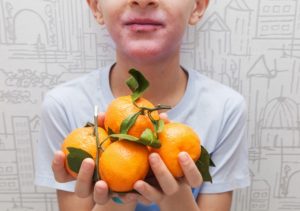With the rise in food allergies over the last 10 to 20 years, parents are understandably concerned about what can be done to reduce the chances of their child developing a food allergy.
A food allergy is when your child’s body has a bad immune reaction to a certain food. This is different from food intolerance which does not affect the immune system. This is true even though some of the same signs may be present.
What Causes Food Allergy in a Child?
Your child’s immune system fights off infections and other dangers to keep him or her healthy. Food allergies occur when your child’s immune system decides that food is a “danger” to your child’s health. The reason this happens isn’t clear. Your child’s immune system sends out antibodies that react to the food and cause the release of histamines and other chemicals. These chemicals can cause hives, asthma, itching in the mouth, trouble breathing, stomach pains, vomiting, or diarrhea. It doesn’t take much of the food to cause a severe reaction in highly allergic children.
Eggs, milk, and peanuts are the most common cause of food allergies in children. Although many children “outgrow” their allergies, some food allergies may be life long. It would be best to discuss your child’s food allergies with his or her allergy doctor.
What are the Symptoms of Food Allergy?
Allergic symptoms may begin within minutes to an hour after ingesting the food. The following are the most common symptoms of food allergy. However, each child may experience symptoms differently. Symptoms may include:
- Vomiting
- Diarrhea
- Cramps
- Hives
- Swelling
- Eczema
- Itching or swelling of the lips, tongue, or mouth
- Tightness in the throat
- Difficulty breathing
- Wheezing
How to Reduce Children’s Risk for Developing Food Allergy?
-
Introduce common food allergens.
The foods that cause 90% of allergic reactions in the United States are milk, eggs, peanuts, tree nuts, shellfish, fish, soy, and wheat. These foods should be introduced to babies between the ages of 4 and 6 months, just like any other solid food is started. The safest way to introduce highly allergenic foods is to do it in a home setting, rather than at daycare or at a restaurant. An allergist’s office also can be a good setting for children with a high risk of allergy, those who have at least one parent or sibling with an allergic condition such as atopic dermatitis, a food allergy, asthma, or allergic rhinitis. As with any food introduction, the parent should go slowly and feed a small amount of just one food at a time, and then wait three to five days before trying the next new food.
-
Nurse your baby.
Breastfeeding your baby may help prevent the development of food allergy. Since breastfeeding is linked to many other health benefits, it is highly recommended to continue breastfeeding until 2 years of age.
-
Keep eczema under good control.
To manage eczema, you need to moisturize daily and utilize medication as your doctor prescribed it. It also helps to avoid allergy triggers. If you need help controlling your baby’s eczema, talk to your baby’s pediatrician or allergist.
How to Introduce Allergens to Your Infants?
Peanuts
Many older infants, between 10 months to 1-year-old, are able to handle a thin layer of smooth peanut butter melted on toast. Brands with no added sugar, oil and/or salt are widely available, as are organic versions. As with all sticky foods, keep a close eye to make sure the baby doesn’t choke. Other options are homemade baked goods with no added sugar that contain peanut butter; quick-cooking oats mixed with peanut butter and mashed banana can be baked into a soft “cookie” that older infants can self-feed.
Eggs
The AAAAI recommendations suggest that cooked egg may be a better way to expose infants to egg protein than baked egg because the protein remains more intact. Introduce cooked egg by mixing it in cereal.
Milk
While a little of liquid cow’s milk in a mixed dish or baked food is fine for infants six to 12 months, the AAAI and AAP caution against offering liquid cow’s milk as a beverage until after baby turns 12 months old. This is because cow’s milk, unlike the breast-milk or formula it displaces, contains no iron and can, therefore, increase a child’s risk for developing anemia.
Fish
Mild white fish or salmon can be cooked simply and pureed into baby food with a touch of breast-milk or formula for infants as young as six months old. Freeze leftovers in 1-ounce ice cube trays, and defrost as needed. Pureed fish goes well with baby favorites like mashed avocado, green beans, peas, sweet potatoes, and carrots.
As a parent, it’s so hard to see your child suffer from the consequences of their allergies. If it helps, there’s an amazing allergist in Boca Raton, South Florida, Dr. Amy B. Schiffman. She treats a wide range of allergy and immunology related disorders including environmental, food and drug allergies, skin disorders, sinus issues, asthma, and immunodeficiency. She can help you ease your worries and help your child manage their food allergies better. To schedule an appointment, you can call her office at 561-409-2800 or email them at contactus.aais@gmail.com. You can also visit her clinic at 7100 Camino Real Suite 121, Boca Raton, Florida 33433.
Keep your child healthy all the time. Visit Dr. Amy Schiffman today!

